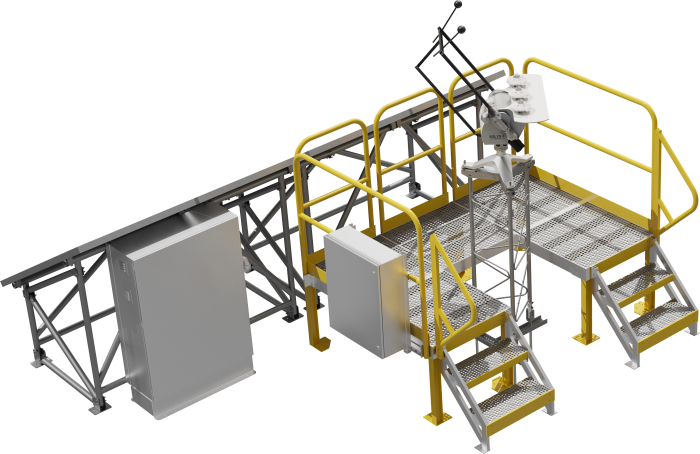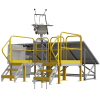Overview
The CSP100 is a turn-key automated data-acquisition system specifically designed to meet CAISO meteorological station requirements of concentrated-solar-power generating facilities. It is recommended for assessing power-plant performance, which requires the best possible solar resource measurements.
The CSP100 is field-ready, with features to minimize installation time and field wiring errors. Though offered as a turn-key package, nearly every aspect of the system is customizable, including sensors, communications, mounting, and power supply.
Measurements
Most of the systems we sell are customized. These systems, however, typically measure the following parameters:
- Wind speed
- Wind direction
- Air temperature
- Relative Humidity
- Barometric pressure
- Precipitation
Benefits and Features
- Contains a Campbell Scientific CR1000 Measurement and Control Datalogger
- Provides the lowest uncertainty of the GH, DNI, and DIFF solar radiation measurements
- Fast to field with industry-proven, high-accuracy sensors
- Factory fabrication, programming, and testing minimizes field wiring errors and reduces deployment time
- Meets CAISO required meteorological data points
- Approved California ISO Remote Intelligent Gateway (RIG) for secure encrypted information transmission to CAISO
- Complies with Modbus, DNP3, CANbus, and PakBus protocols
- Supports nearly all communication technologies such as RS-485, fiber, TCP/IP, cellular, or satellite
- Reference design: “Solar Resource and Meteorological Project (SOLRMAP)”, NREL
- Provides a modular, programmable, and customizable system
- Provides a battery back system that allows data collection during power outages and network failure
- Acts as single point data gateway for environmental, inverter, and meter data
- Supports TCP/IP functionality, including: HTTP Get, HTTP Post, FTP server and client, TelNet server, PING, Micro serial server, DHCP client, DNS client, email send and receive
- Supports Web Service API
- Supports individual module and string level power measurements
- Shipped with a quick-deploy installation guide and system schematics
Images










FAQs for
Number of FAQs related to CSP100: 6
Expand AllCollapse All
-
While the trackers Campbell Scientific uses can vary in their maintenance needs, all the trackers are fairly maintenance free when compared with the solar sensors. The solar sensors should be cleaned daily—at the minimum, weekly. The required maintenance cycle varies based on location, precipitation, and biologic activity.
-
No. The main concern when installing the system is to ensure that the stand is secure to the ground and that the sensors are aligned and leveled. With patience, these tasks can be performed fairly easily.
-
Depending on the tracker being used, a Campbell Scientific data logger can request data, relay diagnostic information, and potentially control the tracker.
-
Unlike the Solar1000, the CSP100 is intended as a system to measure direct normal irradiance (DNI). DNI is solar radiation that comes in a straight line from the direction of the sun at its current position in the sky. DNI is important for concentrated solar power, concentrated photovoltaic (CPV), and solar thermal systems.
The Solar1000 is intended to be used for traditional photovoltaic technology.
-
No. Sensors are manufactured by Hukseflux, EKO Instruments, Kipp & Zonen, and Eppley Laboratory. Contact Campbell Scientific for more information, including sensor tracker compatibility.
-
The CSP100 can be used for both resource assessment and power performance. If the system will be used for resource assessment, the following items are needed: a dc power supply, a solid foundation for the tracker stand, and, perhaps, a general meteorological sensor stand.
Note: The solar tracking component of the CSP100 requires a rather high power draw for remote use (>15 W when powered with Vdc, >21 W when powered with Vac, and potentially up to 100 W).